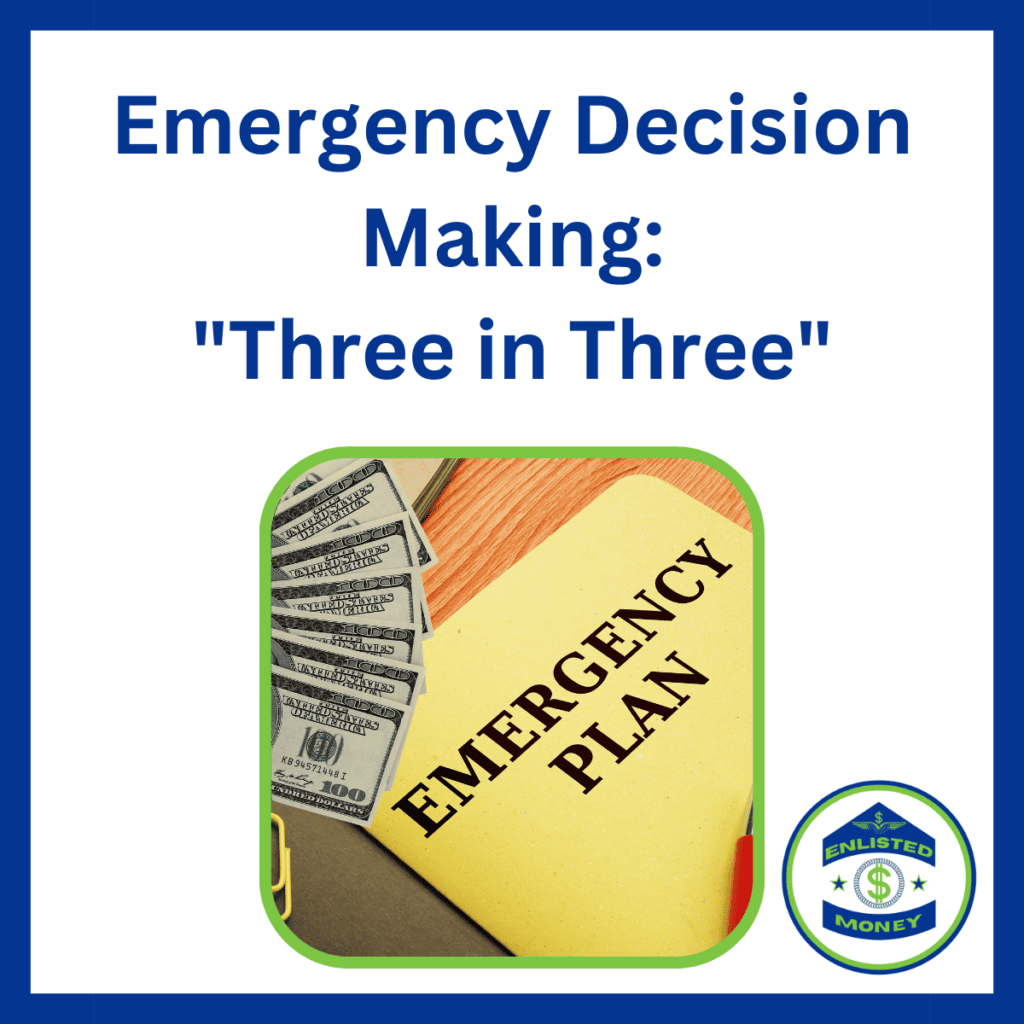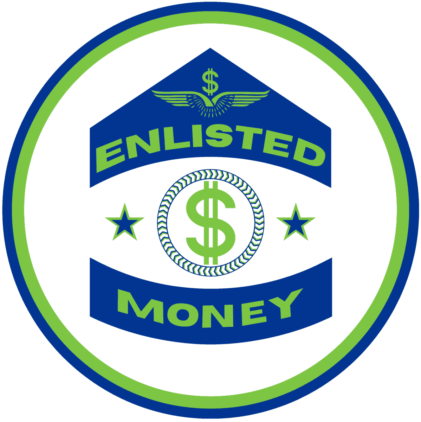
The time to think through a financial emergency is not during the emergency. When you’re in a stressful situation, if you don’t already have a game plan, you’re going to make mistakes – sometimes “financially fatal” mistakes. You really do want to know what to do in crisis, but that’s not always possible.
Instead, I want to help you think through a simple framework we use to plan for, think through, and make financial decisions when you’re in crisis mode – the “Emergency Three in Three” framework. I have definitely made poor financial decisions in an emergency many times before. However, I’ve learned a lot over the years and have a much better time with this now.
Is This Really an Emergency?
An emergency, a true emergency, is something that will “break” something in your life. In other words, will you be unable to maintain your health, safety, or ability to provide basic needs like food, clothing, shelter, or healthcare? If the answer is no, then this might be an emergency.
You’re literally not going to be able to eat tonight; that’s getting into emergency territory. If your furnace goes out and it’s the dead of winter, that’s an emergency. If the transmission or engine “craps the bed” and you or your spouse can’t get to work, that may be entering emergency territory.
Not Everything is an Emergency.
It’s important to be able to know the difference between a true emergency and a major inconvenience so you can make good decisions. Not being able to go out to eat or to the bar this weekend – not an emergency. Having to buy new running shoes – not an emergency. The radio goes out in your truck you guessed it – not an emergency.
You Can “Emergency Proof” Your Life
It’s also important to note that you can avoid having actual emergencies. By getting your personal finances straight, you can turn most emergencies into inconveniences or slight headaches.
For instance, if your car dies, but you have money set aside for emergencies, what we’re going to call an emergency fund, you can decide whether to repair or replace the car and move on. Also, if you can easily hitch a ride or walk to work, then you have more time to save up and get things together.
Save Some Money, Make a Friend (Maybe for Life)
As a matter of fact, asking battle buddies, friends, and neighbors for help is one of the best ways to make friends or strengthen friendships. The best friends I’ve ever had (and still have to this day) were built upon helping each other – on both sides. Military members in particular love to help other people. If you don’t ask, you’re taking away an opportunity for them to feel good about helping you out.
Yep, It’s an Emergency
Okay, so you’ve looked at everything and this is a no-nonsense, bona fide emergency. The first thing you need to do is stop, take three minutes, and answer the following three questions:
- How much time do I have?
- What resources do I have?
- What’s the perfect ending to this emergency?
It doesn’t take very long at all to go through the “Emergency Three in Three.” Even if this is on your way to a financial institution or resource, you can turn off the radio or podcast and think through these three questions for one minute each. Trust me, it’s going to save you time and money.
How much time do I have?
This seems simple, but when we’re in emergency or crisis mode, we do what we’re trained to do in the military and focus on eliminating the threat – at all costs. Very few financial emergencies take this level of intensity. If “at all costs” ends up hurting your finances even more in the future, you’re just adding insult to injury.
You wouldn’t move a casualty with a potential spine injury if you don’t have to. Similarly, you don’t want to take any drastic measures (maxing a credit card, payday loans, selling things you actually need, etc.) in your financial life if it can cause more damage. If you can stall for time to figure out what the best move is, this is always best. Try to give yourself at least a night or two to sleep on it.
What are the Risks of Doing Nothing?
Can you just ignore this problem completely – at least for a while? A common emergency that comes to mind is when one vehicle breaks down. It’s not that big of an emergency if you still have a second vehicle in the household, or you have the ability to hitch a ride or walk instead. This might be a really good gut check on if you really need whatever is causing the emergency.
On the flip side, I don’t want you to ignore a legitimate problem either. Ignoring actual issues that need to be fixed will only make them worse.
How Can I Buy Myself More Time?
As I already talked about, you want to buy yourself more time to make the best decision. For instance, if you have an emergency fund, this can give you a buffer to gain more time to make a sound financial decision.
If you don’t have an emergency fund, commit to starting your emergency fund started right after this crisis is over. Then forgive yourself for not having one and continue working through the issue at hand.
What Resources Do I Have?
Luckily for military members, we have an abundance of options for help. Seriously, if you’re going to have a problem in life, it’s a total blessing to be in the military or be a veteran. People really want to help, and there are programs available only to you.
You can start on the Enlisted Money resources page. Note: if there’s a resource I missed (I know there are a couple), please send me an email so I can add it. Otherwise, you can check your base resource page or go to the community center. Don’t forget to check local resources outside off base too. You might be surprised at what you may find.
Military Aid Societies
Military aid societies are a great resource when you’re in a pinch. Personally, I want you to be self-sufficient, but for many of us, an emergency or major life transition is our “gateway drug” to getting our finances straightened out.
I recently had a conversation with Mr. Timothy Brady, Director at the Navy-Marine Corps Relief Society, Cherry Point, NC, on this topic and this is what he had to say:
“I think at stages of the financial journey emergencies will be handled differently. For those in service, my first piece of advice would be to seek budget counseling from one of the base advisors (or someone who is not trying to sell you something).
Often times, if we don’t have an emergency fund set up, an honest assessment of our finances can often show us ways to cover the expense inside our paychecks. If the emergency fund or our budget can’t cover the expense, a selfless plug is seeking help from one of the Military Aid Societies (MAS). In my current role, the Navy-Marine Corps Relief Society mission is to help our members when in need with no cost, zero interest loans and grants.”
The base counselors he’s talking about are the Department of Defense Personal Financial Counselor (PFC) (no, not that kind of PFC) Program. Here’s the link to their PFC locator tool.
What’s the Perfect Ending to this Emergency?
Finally, I want you to really think about what the best ending to the story is. If you could wave a magic wand, what would be the best solution? (Besides winning the lottery of course.) For instance, these might be some outcomes you want:
- I want to never worry about my car breaking down again.
- I want to have an extra $1,000 set aside for an emergency.
- I want to fix my car without going into more debt.
- I want to have groceries paid for the month.
- I don’t want any more debt payments.
You may not be able to get there right away, but this situation can be a springboard to get you started on the right path. It can also help you get a better game plan together for next time. For instance, I made a mistake in trying to fix my truck even though I knew it wasn’t really worth fixing. Now I know to stick to my original plan and sell a vehicle when it’s becoming a money pit.
I just want you to take a deep breath and really think about what you really need to accomplish to get through this current emergency and where you want to be after this is over.
Take Action to Prepare for Your Next Emergency – It’s Coming
I don’t know when you’ll get hit with an emergency financial situation, but I know it’s coming – especially if you don’t prepare. I hope you’ll commit to not having any more emergencies – just inconveniences because you have your finances in order. If you have enough money saved up, you eliminate a lot of problems.
If you don’t know where to start, please consider grabbing your copy of my free Get Started Checklist™ below. Also, if you’ve just gone through a crisis or made a mistake, I’d love you hear your Enlisted Money Confession. Even better, once you turn things around, I really want to hear your Enlisted Success Story too! Good luck!
